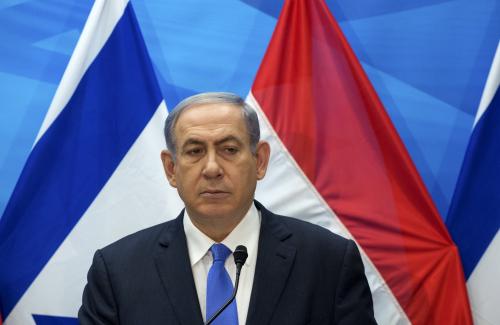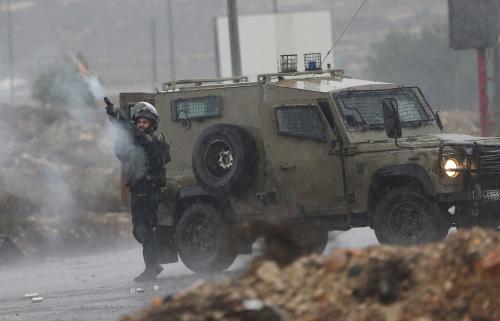As in any presidential transition, the Trump administration will face the difficult task of charting a clear grand strategy for America and will experience the ever-present tension between the urge to act on events and the need to understand them first. The international environment is a global ecosystem in a state of flux, and many players around the globe are already trying to influence Trump’s worldview. Tests and surprises may await the new president on Day One from many corners of the globe.
In this environment, the president-elect will need to be ready from the outset, but the failure to prepare and the absence of a coherent U.S. strategy at the start could lead to policy setbacks and even crises. No one yet truly knows which direction President-elect Trump may go, and his new team will need to resolve the inconsistencies and contradictions in his statements thus far. Already, experts have published heaps of recommendations and to-do lists for the president-elect in the hopeful attempt to, somehow, impact his strategy in preparation for such events.
Second Lebanon War: Learning the strategic lessons too late
I would like to offer an Israeli reference that could be relevant to those looking to prepare the incoming president for his upcoming challenges. The following is a formative lesson (among others) that I learned in my time as head of the Israeli Military Intelligence Research Division (2006-2011), where I was responsible for intelligence for the Israel Defense Forces (IDF) General Staff, the Defense Ministry, the cabinet, and the prime minister’s office. Later, in my mission as commander of the Israeli National Defense College and military academies (2011-2015), we used these lessons to develop operational and strategic thinking among the future leaders of our national security apparatus.
In the summer of 2006, a new set of Israeli leaders was taken by surprise. Hezbollah ambushed an Israeli patrol along the international border, which left three Israeli soldiers dead and two captured and taken to Lebanon. This surprise incident spiraled into a conflict that would drag on for 34 days in what we now call the Second Lebanon War. In the aftermath of the war, the government-appointed Winograd Commission of inquiry issued a scathing critique of key decisionmakers in the government and military, which triggered a wave of resignations.
With the benefit of ten years of hindsight, I have come to realize that a crucial explanation for the disappointing Israeli strategic and operational performance during the war was the lack of preliminary systemic learning process among the country’s top leadership. In effect, the surprise ambush in 2006 exposed the leadership’s lack of strategic preparedness.
In effect, the surprise ambush in 2006 exposed the leadership’s lack of strategic preparedness.
While the possibility of a Hezbollah ambush was well-understood and extensively discussed at all levels, the focus of decisionmakers was primarily on tactical prevention and retaliation. What was lacking was a coherent strategy and appropriate strategic and operational response options for dealing with such an incident and its possible ramifications.
The lack of a systemic learning process was amplified by unique circumstances; at the time, the top figures in the government were new to the job and had limited experience with such crises. Moreover, some in the military leadership brought to the table deeply entrenched preconceptions that were neither explicitly articulated nor shared with their peers. Only during the course of the war did the stark differences in approach between key decisionmakers reveal themselves—differences that should have been aired and explored well beforehand. Consequently, they had not acquired the necessary collective strategic knowledge for a national leadership team. When the guns roared, it was virtually impossible to implement a meaningful process of knowledge development and sharing that would yield relevant strategic and operational options. In such an environment, even the most brilliant expert analysis and recommendations could not have any real impact.
In the decade since the Second Lebanon War, there have been attempts in Israel to internalize these lessons and to institutionalize this demanding approach to knowledge generation, and we have known both successes and failures. However, strategy—as I understand it and as we teach it in the IDF—is not a guide set in stone by a supreme authority. Rather, it is an ongoing learning process based on critical inquiry of the changing ecosystem and its origins and rationales. In this kind of systemic analysis, it is critical to understand the “otherness of the others” in the system—to explore their fundamentally different interpretation of reality, which is usually one of the main challenges of intelligence; but it is also important to try to better understand “our” rationale (i.e. understanding ourselves as well as others).
This process also involves interpreting the emerging reality in comparison to previous assumptions, as well as the evolving gap between the new understandings and the former paradigm and policy. This analysis includes the evaluation of the new potential threats, opportunities, and systemic centers of influence, which should be implemented by a relevant intervention in order to affect reality and to promote national interests.
[S]trategy as a practice is first and foremost a learning process.
The generated knowledge enables translating abstract ideas into the relevant planning of campaigns, operations, and tactics. The learning system that enables such an outcome is comprised of a range of decisionmakers and experts, though the discussions and the atmosphere should be based on discourse rather than just dialogue—while hierarchic dialogue aspires to achieve consensus, discourse encourages learning through thoughtful extraction of differences between views proposed by the various participants.
It is essential for the decisionmaker to lead and participate in the knowledge development process. During a crisis, it is unrealistic to expect a leader to gain the insights needed to respond effectively without the preparatory steps. In that sense, strategy as a practice is first and foremost a learning process.
The new American context
It is not yet known what impact of the long list of policy recommendations to President-elect Trump will have. However, in considering Israel’s lessons, the United States government decisionmaking apparatus could construct a new strategic learning system consisting of four connected and combined domains:
- The core circle of the president-elect and his team;
- Major governmental agencies, facilitated by the National Security Council staff;
- Knowledge institutions, including think tanks and academia; and
- Key U.S. allies and strategic partners.
The Obama administration has been criticized by many potential members of the three outer domains for its perceived impenetrability and inaccessibility. In seeking to avoid such an outcome, the incoming leadership could strengthen the benefits of this approach by demonstrating a genuine sense of openness and collaboration.
While the new presidential team—and particularly the National Security Council—has the main responsibility for establishing, facilitating, and steering such a system, the other relevant players should also be proactive and form new formal and systematic learning processes. If they seek to have real impact, they may first have to gain new understandings of the consequences of the emerging international ecosystem. They will also have to probe the contradictions and incoherence that characterized some of Trump’s stated views and engage relevant circles to design a new American strategy. For that, all sides must find dependable multilateral channels of discourse.
We can find a source of inspiration in American history, when a leader embarked on a sincerely comprehensive process of strategy design. In 1953, President Eisenhower initiated a strategic learning process known as “Project Solarium.” It was based on three teams comprised of leading experts from government and academia, who were encouraged to challenge American strategy while emphasizing the differences and disagreements between them. The outcome of this rare process enabled the president and his core circle to shape a new American strategy and long-term planning.
The concept of strategy as a systemic learning process is very demanding in that it seeks to change the fundamental habits of many stakeholders. However, lessons from Israel may suggest that its absence can lead to disaster.
Is this a naïve approach? Maybe, but no more so than sending long to-do lists and hoping to have an impact. It is this essential process that will enable the substance for a coherent American strategy in the world.






Commentary
Strategy as a learning process: An Israeli case study for the new administration
November 29, 2016